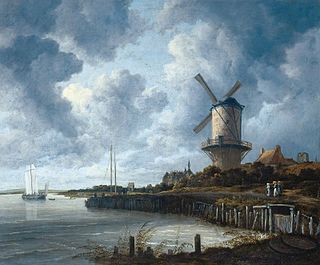
The Windmill of Wijk bij Duurstede is an oil-on-canvas painting by the Dutch painter Jacob van Ruisdael. It is an example of Dutch Golden Age painting and is now in the collection of the Amsterdam Museum, on loan to the Rijksmuseum.

The Ray of Light, also known as Le Coup de Soleil, is an oil on canvas painting by the Dutch painter Jacob van Ruisdael. It is an example of Dutch Golden Age painting and is now in the collection of the Louvre Museum.

View of Bentheim Castle is an oil on canvas painting of Burg Bentheim by the Dutch landscape painter Jacob van Ruisdael. It is an example of Dutch Golden Age painting and is now in the collection of the Rijksmuseum.

Two Watermills and an Open Sluice near Singraven is an oil on canvas painting by the Dutch landscape painter Jacob van Ruisdael. It is an example of Dutch Golden Age painting and is now in the collection of the National Gallery.

Landscape with Waterfall is an oil on canvas painting by the Dutch landscape painter Jacob van Ruisdael. It is an example of Dutch Golden Age painting and is now in the collection of the Amsterdam Museum, on loan to the Rijksmuseum.
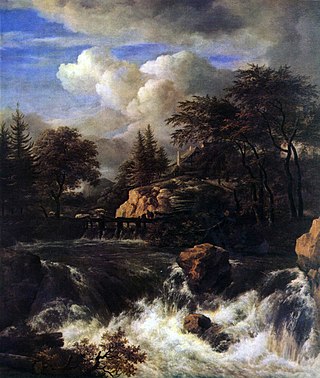
A Waterfall in a Rocky Landscape is an oil painting on canvas by the Dutch landscape painter Jacob van Ruisdael. It is an example of Dutch Golden Age painting and is now in the collection of the National Gallery.

A Landscape with a Ruined Castle and a Church is an oil on canvas painting by the Dutch landscape painter Jacob van Ruisdael. It is an example of Dutch Golden Age painting and is now in the collection of the National Gallery.

A Wooded Marsh is an oil on canvas painting by the Dutch landscape painter Jacob van Ruisdael. It is an example of Dutch Golden Age painting and is now in the collection of the Hermitage Museum in St. Petersburg, Russia.
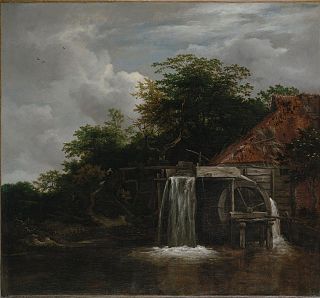
The Watermill is an oil on canvas painting by the Dutch landscape painter Jacob van Ruisdael. It is an example of Dutch Golden Age painting and is now in the collection of the National Gallery of Victoria.
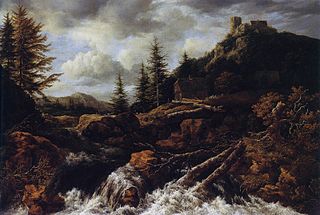
Waterfall in a Mountainous Landscape with a Ruined Castle is an oil on canvas painting by the Dutch landscape painter Jacob van Ruisdael. It is an example of Dutch Golden Age painting and is now in the collection of the Mount Stuart House.

Landscape with a Cottage and Trees (1646) is an oil-on-panel painting by the Dutch Golden Age painter Jacob van Ruisdael. It is in the collection of the Kunsthalle in Hamburg.
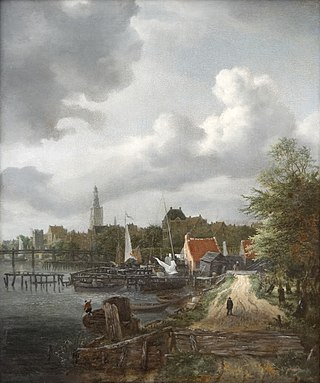
View of the Binnenamstel at Amsterdam is a 17th-century oil on canvas painting by the Dutch Golden Age painter Jacob van Ruisdael. It is in the collection of the Museum of Fine Arts in Budapest.

Panoramic view of the Amstel looking toward Amsterdam is a 17th-century oil on canvas painting by the Dutch Golden Age painter Jacob van Ruisdael. It is in the collection of the Fitzwilliam Museum in Cambridge.
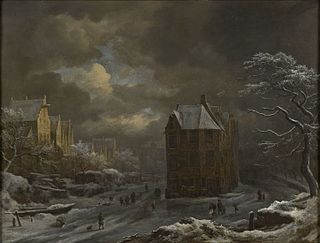
Winter View of the Hekelveld in Amsterdam is a 17th-century oil on canvas painting by the Dutch Golden Age painter Jacob van Ruisdael. It is in a private collection in Scotland.

Evening Landscape: A Windmill by a Stream is a 17th-century oil on canvas painting by the Dutch Golden Age painter Jacob van Ruisdael. It is in the collection of Queen Elizabeth II, on display at the Queen's Gallery at Buckingham Palace. It was acquired by King George IV in 1810.

View of the Dam and Damrak at Amsterdam, also known as The Damrak in Amsterdam, is a 17th-century oil on canvas painting by the Dutch Golden Age painter Jacob van Ruisdael. Since 1866 it is in the collection of the Museum Boymans van Beuningen in Rotterdam.

View of the Dam and Damrak at Amsterdam, also known as Quay at Amsterdam, is a 17th-century oil on canvas painting by the Dutch Golden Age painter Jacob van Ruisdael. It is since 1910 in the Frick Collection in New York. It is currently not on view.

View of the Dam and Damrak at Amsterdam is a 17th-century oil on canvas painting by the Dutch Golden Age painter Jacob van Ruisdael. It is in the collection of the Mauritshuis in the Hague. It gives a bird's eye view of the crowd watching the parade of the civic guard on the Dam Square, the main square of Amsterdam.

View of Haarlem from the Northwest, with the Bleaching Fields in the Foreground is an oil on canvas painting by the Dutch landscape painter Jacob van Ruisdael. It is an example of Dutch Golden Age painting and is now in the collection of the Rijksmuseum.

Landscape with a Windmill Near a Town Moat is an oil on canvas painting by the Dutch landscape painter Jacob van Ruisdael. It is an example of Dutch Golden Age painting and is now in a private collection.























